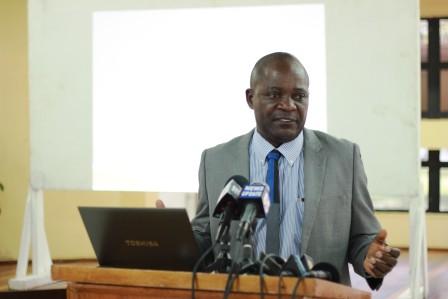New University of Guyana (UG) Vice-Chancellor Professor Jacob Opadeyi today stated that if the university is to be rebranded a high quality tertiary institution, its administrators must, among other things, find ways to increase the “ridiculously low” tuition fees currently paid by students.
The standard tuition fee for most programmes at UG is an average $127,000 per year (approximately US$600), which is seen as quite meagre when compared with the US$9,000 commonly charged by many other universities. The difference, Opadeyi said at his first press conference since assuming office on February 11, is incomparable. He also mentioned that a research which was carried out revealed that it costs UG approximately $355,000 per student a year. As a result, the practice of maintaining low fees, he said, cannot continue.

Opadeyi said that the price has also remained so low partially because “up to now the university is run as a social programme and this must change. The level of your tuition will affect your education.”
Low fees coupled with insufficient subventions and other factors were blamed for the $300 million deficit incurred by UG last year.
The Vice-Chancellor stated that the maintenance of low tuition fees over the years have made the university substantially dependant on the subventions it receives from the Government of Guyana (GOG). These insufficient funds, he added, have been responsible for the need in many cases to cut particular university programmes or activities.
Opadeyi stated that there is an economic cost attached to running UG, which should not be borne by government subventions and he added that the essence of freeness, which obtains under government subsidized education, needs to stop. “You cannot get quality for free, someone needs to pay,” Opadeyi said.
There has long been strong opposition by sections of the society to any raise in UG’s tuition fees. Many have argued that considering Guyana’s high cost of living, it would be unreasonable to raise fees any higher than they currently are. Others have even argued that tertiary education ought to be free, as was the case in previous years.
However, Opadeyi maintained that fees need to be seen by students as an investment in their future, and he added that a cheap education will be deficient in quality. Opadeyi said that if students want to have high starting salaries after they graduate, they must be willing to invest in the quality of education that will avail them such a salary.
This quality, he said, would be provided by the qualified lecturers who need to be highly paid for the quality of learning experience they would be providing.
“A better tuition means more money to pay lecturers,” said Opadeyi, echoing a position that has been held by members of “Operation Rescue UG” since its inception.
The members of Operation Rescue UG have long held that one of the greatest threats to students is the loss of quality lecturers as a result of the unsavoury wages package offered. Dr Patsy Francis, head of the University of Guyana Senior Staff Association (UGSSA) and others have maintained that in order for the students of the university to receive a quality education, there must be teachers with quality knowledge in the various subject areas
Dr. Mellissa Ifill, UGSSA Vice-President, had explained that UG is currently faced with a dire human resource deficiency. She said that only about 4% of the lecturers employed have PhDs, while 35% have only first degrees. If a higher level of education is to be provided to students, she said, this situation would need to change. Francis stressed that the level of salary offered by UG impacts its ability to retain highly-qualified lectures and noted that even after training lecturers, UG will still risk losing them if their salaries are insufficient. “To attract and retain highly-qualified lecturers and researchers, there must be a competitive salary or else they will leave,” Ifill said. She also mentioned that the university currently has a very high turnover rate, which is due, among other things, to the salary it offers.
President of the University of Guyana Student Society (UGSS) Ganesh Mahipaul had told Stabroek News recently that he would oppose any proposals for increases since it would not be in the best interest of UG students
However, Dr. Ifill had explained that what is being called for really is not an increase, but a regulatory adjustment to a decision that was made decades ago. Ifill said that in 1994 it was decided that tuition fees would stand at US$1000, but that the Guyana currency has since depreciated. She said that the system has never been adjusted to accommodate this depreciation and that it needs to be corrected.
Mahipaul said today that the UGSS would only support the increase on the basis that it is incremental, and as long as the benefits promised by the Vice-Chancellor are imminent.
Opadeyi promised that the process of the increase would be extremely transparent, and he also disclosed that a regional consultant will be hired to do a comparative study of salaries. A decision on the matter will be made at the end of the process.
“The price of bread ten years ago cannot be the same ten years later,” Opadeyi said. “Money is raised by selling services and UG is in the business of selling degrees and diplomas to students,” he added.
When asked if he foresees government cooperation in the raising of tuition fees, Opadeyi said as long as common sense prevails, the increase should be implemented without issue. “The challenge now is not if but how and if the government says no to the increase then they need to increase the subventions given to the university,” he added.




